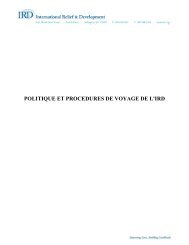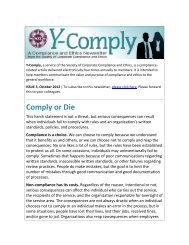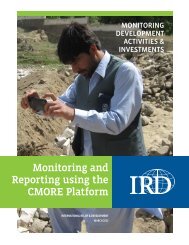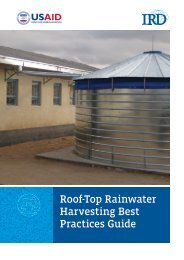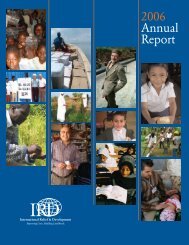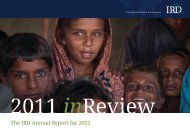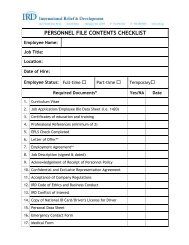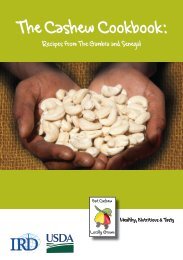Empowering citizens Engaging governments Rebuilding communities
Empowering citizens Engaging governments Rebuilding communities
Empowering citizens Engaging governments Rebuilding communities
Create successful ePaper yourself
Turn your PDF publications into a flip-book with our unique Google optimized e-Paper software.
“Local leaders were not paying attention to everyday people.<br />
They would focus on their relatives or close friends. It wasn’t<br />
the real people in need. And with ICAP we went directly to the<br />
people in need.”<br />
— Iqbal al-Juboori<br />
Economic sanctions against Iraq following the 1991<br />
Gulf War meant fewer economic and political opportunities,<br />
while decreasing quality in public education led to<br />
a surge in adult illiteracy among Iraqi women—as high<br />
as 45 percent by 2000, according to United Nations<br />
(UN) estimates. After the US-led invasion in 2003, the<br />
Coalition Provisional Authority was charged to advance<br />
women’s rights and to leverage women’s “skill and<br />
knowledge” in the “revival of their country.” But in<br />
aftermath of the occupation, the reality on the ground<br />
was that huge numbers of Iraqi women had to support<br />
their families, and they had to do so after decades<br />
of diminished educational opportunities had severely<br />
thwarted their technical skills and capabilities.<br />
“Early on, I met a widow who was responsible for<br />
feeding her two sons and one daughter, her father,<br />
her mother, and her two sisters,” said Iqbal al-Juboori,<br />
who at the time was an IRD business development<br />
program officer in Baghdad. “She was the head of the<br />
family. Her parents were too old to work, her children<br />
too young, and her sisters couldn’t. Her husband was<br />
killed during the war, and she didn’t know what to do.<br />
Then she heard about IRD.”<br />
Al-Juboori, who is Iraqi, joined IRD in July 2005,<br />
two years after IRD had established its presence in<br />
Baghdad with ICAP. One of ICAP’s cross-cutting objectives<br />
was to encourage the inclusion and empowerment<br />
of women in all activities. The community action groups<br />
at the center of ICAP emphasized ensuring the equality<br />
of men’s and women’s voices, while program grants<br />
and employment programs gave women an opportunity<br />
to engage in the local economy. Internally, IRD hired,<br />
trained, and promoted women employees for nontraditional<br />
management roles with ICAP, including al-Juboori.<br />
IRD staff would often concentrate on widows, treating<br />
them as people in need. When determining grant<br />
awards, program officers would make home visits to<br />
meet them and assess the individual circumstances.<br />
When al-Juboori visited this particular widow, she<br />
found a home no larger than a shelter, a single room<br />
with little furniture housing the full family. The widow<br />
was receiving nominal help, such as used clothes and<br />
food, but as she met with al-Juboori, she remained<br />
defiantly prideful. “I don’t believe anyone can help us,”<br />
she said. “What makes you so special? What makes<br />
you so different? All I need is a decent income for my<br />
family.” As an Iraqi woman, al-Juboori knew that she<br />
had an exceptional opportunity to relate to this widow,<br />
standing there in the middle of her home. “You’ve got<br />
nothing to lose,” she said. “So try us.”<br />
As with many Iraqi women, the widow had no discernible<br />
skills or earning power. Al-Juboori described<br />
one of ICAP’s business development opportunities,<br />
a home-based sewing program in which IRD would<br />
7


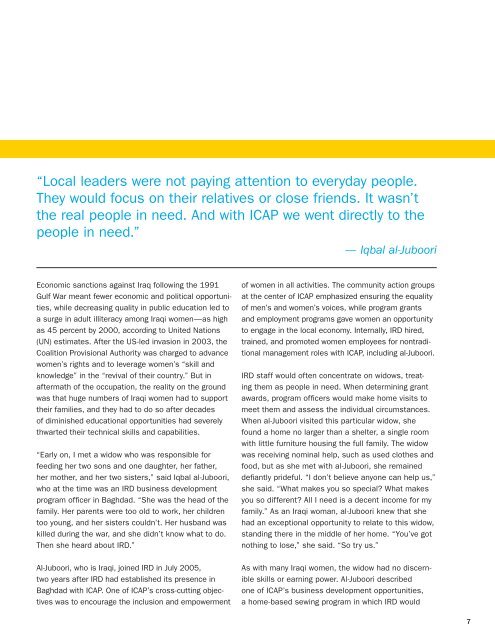
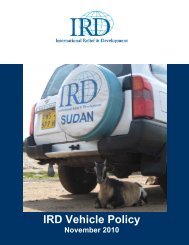
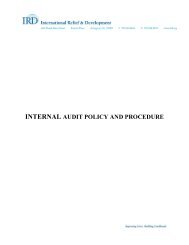
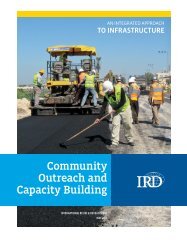
![Guide bonne pratique production d'oignon qualité_VF_4_2411012[1]](https://img.yumpu.com/23506639/1/184x260/guide-bonne-pratique-production-doignon-qualitac-vf-4-24110121.jpg?quality=85)
